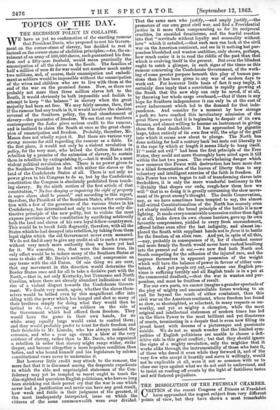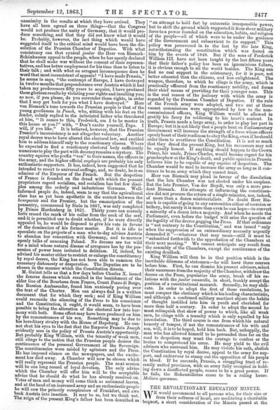THE DISSOLUTION OF THE PRUSSIAN CHAMBER.
CRITICS of the recent Congress of Princes at Frankfort have approached the august subject from very different points of view, but they have shown a most remarkable unanimity in the results at which they have arrived. They have all been agreed on three things—that the Congress would not produce the unity of Germany, that it would pro- duce something, and that they did not know what it would be. Probably, however, the last thing which would have suggested itself to the critical mind would have been the dis- solution of the Prussian Chamber of Deputies. With what consistency can that cynical junker the Herr von Bismark- Schonbausen appeal to the people when he has openly declared that he shall make war without people, consent of their represen- tatives, and has better employment for his time than to listen to their talk ; and with what an arrogant inconsequence does he word that most inconsistent of appeals? "I have made Prussia," he seems to says, "the contempt of Europe, I have destroyed in twelve months that preponderance over Austria which it had taken my predecessors fifty years to acquire, I have produced these glorious results by violating your rights and insulting you; so now, if you please, do you surrender those rights, in order that I may get back for you what I have destroyed." Herr von Bismark's tone towards the Prussian people is that of the young gentleman in Punch, who, sitting with his feet on the fender, calmly replied to the infuriated father who thundered at him, "It comes to this, Frederick, am I to be master in this house or you ?" with, "Don't excite yourself, Papa. I will, if you like." It is believed, however, that the Prussian Premier's inconsistency is not altogether voluntary. Another royal decree was to have altered the electoral law, and enabled him to address himself only to the reactionary classes. Where be expected to find a reactionary electoral body sufficiently numerous to play the part with decencyremains a mystery. The country squires who prefix "von" to their names, the officers in the army, and the higher official employes are probably his only enthusiastic supporters. It has, indeed, been suggested that he intended to resort to universal suffrage, and, no doubt, he is an admirer of the Emperor of the French. But the despotism of France is founded on the dread with which the peasant proprietors regard socialism, and socialism has but few disci- ples among the orderly and industrious Germans. Well- informed people do, indeed, seem to say that the agricultural class has as yet been apathetic in the contest between the bourgeoisie and the Premier, but the emancipation of the peasantry, commenced by Stein in 1807, was only completed by Prince Hardenberg in 1821. Thirty years can scarcely haie erased the mark of his collar from the neck of the serf, and it is permitted one to doubt whether, if he were directly appealed to, he would be disposed to give his vote in favour of the domination of his former master. But it is idle to speculate on the projects of a man who to-day advises Austria to abandon her connection with Germany, and to-morrow openly talks of annexing Poland. No dreams are too wild for a mind whose natural disease of arrogance has by the pos- session of power been irritated to delirium. If, indeed, he advised his master either to restrict or enlarge the constituency by royal decree, the King has not been able to summon the necessary dishonesty or desperation. The Deputies are to be chosen in the manner which the Constitution directs.
M. Guizot tells us that a few days before Charles X. issued the famous decrees which resulted in the banishment of the elder line of the Bourbons from France, Count Pozzo di Borgo, the Russian Ambassador, found him anxiously poring over the text of the Charter. Men can always find in a written document that for which they seek; and if King William could reconcile the silencing of the Press to his conscience and the Constitution, it ought, it would seem, to have been possible to bring the alteration of the electoral law into har- mony with both. Some effect may have been produced on him by the remonstrances of his son. Something may be duo to his hereditary rivalry with the House of Hapsburg. He can- not shut his eyes to the fact that the Emperor Francis Joseph evidently sees in the policy of Prussia Austria's opportunity. But probably King William with the tenacity of weak men, still clings to the notion that the Prussian people desires the continuance of the personal Government of the Sovereign. The constituencies were misled by agitators and the Press. He has imposed silence on the newspapers, and the excite- ment has died away. A Chamber will now be chosen which will really represent the Prussian people. The next session will be one long record of loyal devotion. The only advice which the Chamber will offer him will be the acceptable -advice that he should do what he has already resolved on. Totes of men and money will come thick as autumnal leaves, and at the head of an increased army and an enthusiastic people be will cow the princely conspirators of Frankfort, and awe back Austria into inaction. It may be so, but we think not. The reign of the present King's father has been described as "an attempt to hold fast by autocratic irresponsible power, but to shift the ground which supported it from sheer military force to a power founded on the education, habits, and religion of the people—all of which were to be under the guidance of the Government and subservient to its support." This policy was persevered in to the last by the late King, notwithstanding the constitution which was forced on him by the events of 1848. But if the sons of Frederick William III. have not been taught by the last fifteen years that their father's policy has been an ignominious failure, it is obvious enough to all the world besides. The King can find no real support in the aristocracy, for it is poor, not better educated than the citizens, and less enlightened. The weapon, therefore, to which he clings is the army, which is practically officered from the reactionary nobility, and forms their chief means of providing for their younger sons. This is the real reason of the jealousy with which the army is regarded by the Prussian Chamber of Deputies. If the rule of the French army were adopted, and two out of three vacant commissions were appropriated by law to the non- commissioned officers, King William would be allowed to gratify his fancy for soldiering to his heart's content. In truth, Prussia needs a large army, in order to play her part in Europe; but it is not likely that a people bent on Parliamentary Government will increase the strength of a force whose officers openly boast of their readiness to obey the King, even if he should order them to overthrow the Constitution. It is not so much that they dread the present King, but his successors may not be equally honest. If anything should happen to the Crown Prince, his uncle, Prince Charles, would become regent for his grandnephew at the King's death, and public opinion in Prussia believes him to be capable of any caprice of despotism. The Chamber would be mad to increase the army so long as it con- tinues to be an army which they cannot trust.
Herr von Bismark may plead in favour of the dissolution that the late Chamber was not elected under his auspices. But the late Premier, Von der Heydt, was only a more pru- dent Bismark. His attempts at influencing the constituen- cies did net procure the return of a single minister, nor, indeed, of more than a dozen ministerialists. No doubt Herr Big- mark is capable of going to any extremities either of coercion or bribery, but surely it is more than even he can hope—to convert a minority of a dozen into a majority. And when he meets the Parliament, even before the budget will arise the question of the legality of the decree gagging the Press. If that'ordinance is "not contrary to the Constitution," and was issued "only when the suppression of an extraordinary necessity urgently demanded it "—whatever that may mean—atill it must be "submitted forthwith to the approbation of the Chambers at their next meeting." We cannot anticipate any result from the assembly of the Chambers, except the continuance of the existing deadlock.
King William will then be in that position which is the inevitable dilemma of statesmen—he will have three courses before him. First, he can dismiss his present advisers, select their successors from the majority of the Chamber, withdraw the decree on the Press, popularize the army, break off his re- lations with the junker camarilla, in short, frankly accept the position of a constitutional monarch. Secondly, he may abdi- cate. In order to adopt the first of these resolutions, he must conquer the obstinacy which is his leading characteristic, and although a confirmed military martinet abjure the habits of thought instilled into him in youth and cherished for more than half a century. In order to adopt the second he must relinquish that show of power to which, like all weak men, he clings with a tenacity which is only equalled by his irresolution. The third course is one from which his natural honesty of temper, if not the remonstrances of his wife and son, will, it is to be hoped, hold him back. But, unhappily, the man who has allowed himself to be persuaded thus far on the road to despotism may want the courage to confess or the brains to comprehend his error. He may yield to the evil advisers who surround him. He may violate his oath, abolish the Constitution by royal decree, appeal to the army for sup- port, and endeavour to stamp out the opposition of his people in blood. If he succeeds, Prussia, a straggling tract of re- cently united provinces, with an army fully occupied in hold- ing down a disaffected people, ceases to be a great power. If he fails, the Hohenzollerns cease to be a ruling house. Meliora speramus.



































 Previous page
Previous page